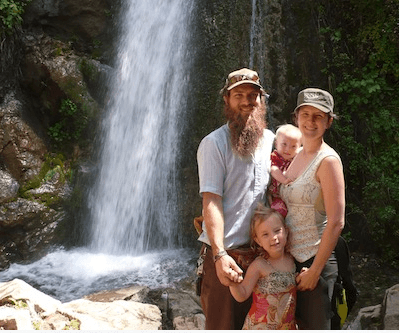
In early 2008, Cole Cottin and Dan Phelps were invited to visit Esalen’s Farm & Garden as part of a larger group of farm apprentices from the University of California, Santa Cruz. Eight years, and two children later, the UC Santa Cruz graduates left their home in Kansas to return to the West Coast to become the farming family in residence at Esalen.
“It felt like a homecoming for Cole and I,” says Dan who serves as Esalen’s gardener while Cole works as farm and garden coordinator. “It’s also lovely to share with our children the region where I grew up.” Dan was first introduced to farm life during summers spent helping his aunt restore a farm in Northern California. He was inspired by the realization that he could create a livelihood from the land. After earning his degree in community studies with a focus on social justice in agriculture, Dan sought more hands-on experience and ultimately established his own farm with Cole in her hometown of Lawrence, Kansas. There, he also helped establish and taught at several local school gardens and at farmer gatherings statewide.
For Cole, who earned her degree in anthropology and is now a student of Hellerwork structural integration, Esalen held the appeal of being the backdrop for Ida Rolf’s work. The Farm & Garden was also a draw in and of itself. “The soil here is black gold! It’s an honor to connect with this compost-rich humus, lovingly cultivated for over 40 years,” says Cole. She attributes her initial interest in agriculture as a result of meeting Dan in college, an interest that was then deepened and enhanced by her involvement with the Peace Corps after college.
“It took running off to the Peace Corp to be an HIV/AIDs volunteer in South Africa to realize what a core social issue food is,” she says, “Dependence on global food supplies is a huge barrier to health where local agricultural connections have eroded.” After living with a traditional healer in an impoverished rural village, Cole saw first-hand the connection between public health outcomes and how food is produced and made accessible (or not). She decided to return home to the States early. “I felt I’d be more useful in my own community,” reflects Cole. Cole then spent years advocating for policy changes to enable Kansans to feed more Kansans. “It’s a sad irony,” she sighs, “to find some of the worst food deserts are in the biggest agricultural areas. Addressing these issues at home has a ripple effect, impacting the entire global food system.”
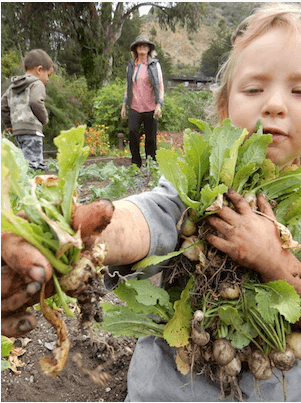
Parents to a one-year-old and four-year-old, Cole and Dan are grateful for the opportunity to have their children not only live at Esalen but experience Esalen’s Gazebo School Park. Cole recalls back to their first visit to Esalen, before they were married, and the strong and positive impression left by Gazebo. She sees a natural heart connection between the Farm & Garden and Gazebo, both unique to Esalen and both focused on nourishing others.
“We are lucky, our little farmer family spends half the time in the Farm & Garden and the other half at Gazebo!” says Cole.
Dan and Cole see a benefit to Esalen having multiple generations reflected in its community. They regularly receive positive feedback and expressions of gratitude for being present with children. Both parents say it’s not uncommon for their daughters to seek out friends during mealtime in the Lodge – friends who range from Gazebo teachers to Esalen staff and community members.
As self-described first generation farmers, Dan and Cole acknowledge the need to steward the Earth for the seventh generation – including their children and their children’s children. “I want to be a good land steward, leaving each place I live in as good if not better condition than I received it,” says Dan, “And I also want to support our farm and garden apprentices to take what they learn at Esalen into their own home communities.”
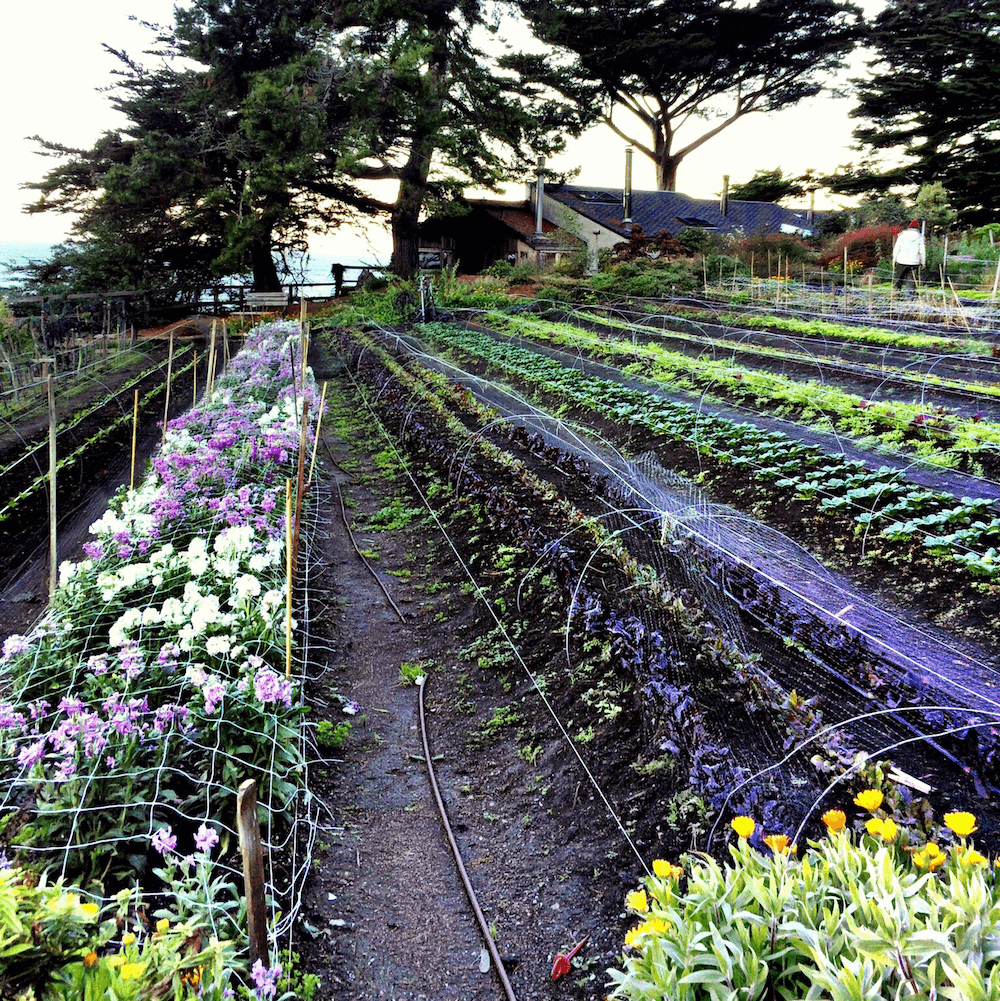
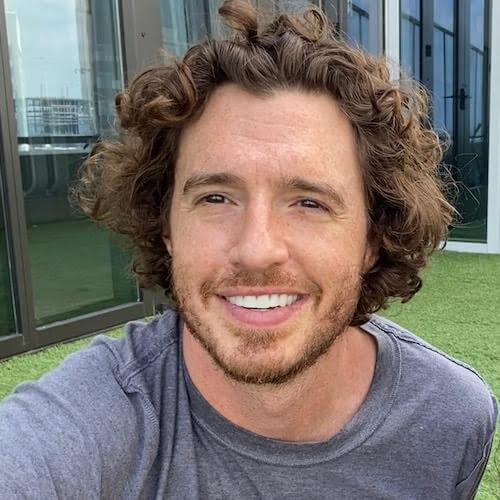
“Remembering to be as self compassionate as I can and praying to the divine that we're all a part of.”
–Aaron
“Prayer, reading, meditation, walking.”
–Karen
“Erratically — which is an ongoing stream of practice to find peace.”
–Charles
“Try on a daily basis to be kind to myself and to realize that making mistakes is a part of the human condition. Learning from our mistakes is a journey. But it starts with compassion and caring. First for oneself.”
–Steve
“Physically: aerobic exercise, volleyball, ice hockey, cycling, sailing. Emotionally: unfortunately I have to work to ‘not care’ about people or situations which may end painfully. Along the lines of ‘attachment is the source of suffering’, so best to avoid it or limit its scope. Sad though because it could also be the source of great joy. Is it worth the risk?“
–Rainer
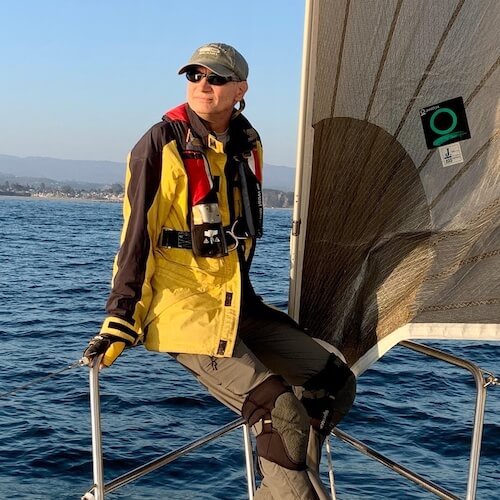

“It's time for my heart to be nurtured on one level yet contained on another. To go easy on me and to allow my feelings to be validated, not judged harshly. On the other hand, to let the heart rule with equanimity and not lead the mind and body around like a master.”
–Suzanne
“I spend time thinking of everything I am grateful for, and I try to develop my ability to express compassion for myself and others without reservation. I take time to do the things I need to do to keep myself healthy and happy. This includes taking experiential workshops, fostering relationships, and participating within groups which have a similar interest to become a more compassionate and fulfilled being.“
–Peter
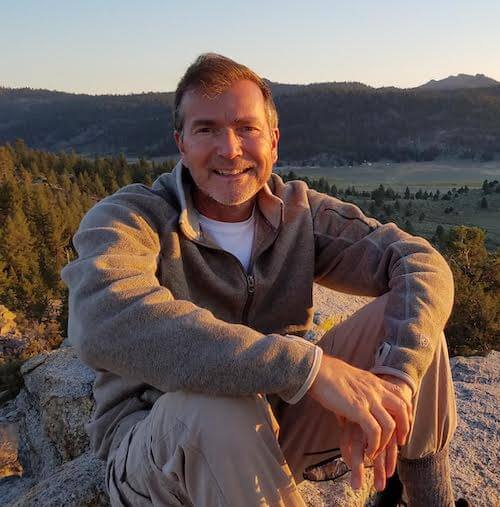
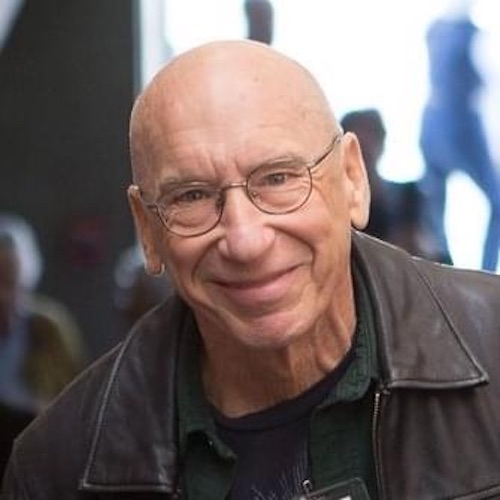
“Self-forgiveness for my own judgments. And oh yeah, coming to Esalen.”
–David B.
“Hmm, this is a tough one! I guess I take care of my heart through fostering relationships with people I feel connected to. Spending quality time with them (whether we're on the phone, through messages/letters, on Zoom, or in-person). Being there for them, listening to them, sharing what's going on with me, my struggles and my successes... like we do in the Esalen weekly Friends of Esalen Zoom sessions!”
–Lori

“I remind myself in many ways of the fact that " Love is all there is!" LOVE is the prize and this one precious life is the stage we get to learn our lessons. I get out into nature, hike, camp, river kayak, fly fish, garden, I create, I dance (not enough!), and I remain grateful for each day, each breath, each moment. Being in the moment, awake, and remembering the gift of life and my feeling of gratitude for all of creation.”
–Steven
“My physical heart by limiting stress and eating a heart-healthy diet. My emotional heart by staying in love with the world and by knowing that all disappointment and loss will pass.“
–David Z.
Today, September 29, is World Heart Day. Strike up a conversation with your own heart and as you feel comfortable, encourage others to do the same. As part of our own transformations and self-care, we sometimes ask for others to illuminate and enliven our hearts or speak our love language.
What if we could do this for ourselves too, even if just for today… or to start a heart practice, forever?

In early 2008, Cole Cottin and Dan Phelps were invited to visit Esalen’s Farm & Garden as part of a larger group of farm apprentices from the University of California, Santa Cruz. Eight years, and two children later, the UC Santa Cruz graduates left their home in Kansas to return to the West Coast to become the farming family in residence at Esalen.
“It felt like a homecoming for Cole and I,” says Dan who serves as Esalen’s gardener while Cole works as farm and garden coordinator. “It’s also lovely to share with our children the region where I grew up.” Dan was first introduced to farm life during summers spent helping his aunt restore a farm in Northern California. He was inspired by the realization that he could create a livelihood from the land. After earning his degree in community studies with a focus on social justice in agriculture, Dan sought more hands-on experience and ultimately established his own farm with Cole in her hometown of Lawrence, Kansas. There, he also helped establish and taught at several local school gardens and at farmer gatherings statewide.
For Cole, who earned her degree in anthropology and is now a student of Hellerwork structural integration, Esalen held the appeal of being the backdrop for Ida Rolf’s work. The Farm & Garden was also a draw in and of itself. “The soil here is black gold! It’s an honor to connect with this compost-rich humus, lovingly cultivated for over 40 years,” says Cole. She attributes her initial interest in agriculture as a result of meeting Dan in college, an interest that was then deepened and enhanced by her involvement with the Peace Corps after college.
“It took running off to the Peace Corp to be an HIV/AIDs volunteer in South Africa to realize what a core social issue food is,” she says, “Dependence on global food supplies is a huge barrier to health where local agricultural connections have eroded.” After living with a traditional healer in an impoverished rural village, Cole saw first-hand the connection between public health outcomes and how food is produced and made accessible (or not). She decided to return home to the States early. “I felt I’d be more useful in my own community,” reflects Cole. Cole then spent years advocating for policy changes to enable Kansans to feed more Kansans. “It’s a sad irony,” she sighs, “to find some of the worst food deserts are in the biggest agricultural areas. Addressing these issues at home has a ripple effect, impacting the entire global food system.”

Parents to a one-year-old and four-year-old, Cole and Dan are grateful for the opportunity to have their children not only live at Esalen but experience Esalen’s Gazebo School Park. Cole recalls back to their first visit to Esalen, before they were married, and the strong and positive impression left by Gazebo. She sees a natural heart connection between the Farm & Garden and Gazebo, both unique to Esalen and both focused on nourishing others.
“We are lucky, our little farmer family spends half the time in the Farm & Garden and the other half at Gazebo!” says Cole.
Dan and Cole see a benefit to Esalen having multiple generations reflected in its community. They regularly receive positive feedback and expressions of gratitude for being present with children. Both parents say it’s not uncommon for their daughters to seek out friends during mealtime in the Lodge – friends who range from Gazebo teachers to Esalen staff and community members.
As self-described first generation farmers, Dan and Cole acknowledge the need to steward the Earth for the seventh generation – including their children and their children’s children. “I want to be a good land steward, leaving each place I live in as good if not better condition than I received it,” says Dan, “And I also want to support our farm and garden apprentices to take what they learn at Esalen into their own home communities.”


“Remembering to be as self compassionate as I can and praying to the divine that we're all a part of.”
–Aaron
“Prayer, reading, meditation, walking.”
–Karen
“Erratically — which is an ongoing stream of practice to find peace.”
–Charles
“Try on a daily basis to be kind to myself and to realize that making mistakes is a part of the human condition. Learning from our mistakes is a journey. But it starts with compassion and caring. First for oneself.”
–Steve
“Physically: aerobic exercise, volleyball, ice hockey, cycling, sailing. Emotionally: unfortunately I have to work to ‘not care’ about people or situations which may end painfully. Along the lines of ‘attachment is the source of suffering’, so best to avoid it or limit its scope. Sad though because it could also be the source of great joy. Is it worth the risk?“
–Rainer


“It's time for my heart to be nurtured on one level yet contained on another. To go easy on me and to allow my feelings to be validated, not judged harshly. On the other hand, to let the heart rule with equanimity and not lead the mind and body around like a master.”
–Suzanne
“I spend time thinking of everything I am grateful for, and I try to develop my ability to express compassion for myself and others without reservation. I take time to do the things I need to do to keep myself healthy and happy. This includes taking experiential workshops, fostering relationships, and participating within groups which have a similar interest to become a more compassionate and fulfilled being.“
–Peter


“Self-forgiveness for my own judgments. And oh yeah, coming to Esalen.”
–David B.
“Hmm, this is a tough one! I guess I take care of my heart through fostering relationships with people I feel connected to. Spending quality time with them (whether we're on the phone, through messages/letters, on Zoom, or in-person). Being there for them, listening to them, sharing what's going on with me, my struggles and my successes... like we do in the Esalen weekly Friends of Esalen Zoom sessions!”
–Lori

“I remind myself in many ways of the fact that " Love is all there is!" LOVE is the prize and this one precious life is the stage we get to learn our lessons. I get out into nature, hike, camp, river kayak, fly fish, garden, I create, I dance (not enough!), and I remain grateful for each day, each breath, each moment. Being in the moment, awake, and remembering the gift of life and my feeling of gratitude for all of creation.”
–Steven
“My physical heart by limiting stress and eating a heart-healthy diet. My emotional heart by staying in love with the world and by knowing that all disappointment and loss will pass.“
–David Z.
Today, September 29, is World Heart Day. Strike up a conversation with your own heart and as you feel comfortable, encourage others to do the same. As part of our own transformations and self-care, we sometimes ask for others to illuminate and enliven our hearts or speak our love language.
What if we could do this for ourselves too, even if just for today… or to start a heart practice, forever?

In early 2008, Cole Cottin and Dan Phelps were invited to visit Esalen’s Farm & Garden as part of a larger group of farm apprentices from the University of California, Santa Cruz. Eight years, and two children later, the UC Santa Cruz graduates left their home in Kansas to return to the West Coast to become the farming family in residence at Esalen.
“It felt like a homecoming for Cole and I,” says Dan who serves as Esalen’s gardener while Cole works as farm and garden coordinator. “It’s also lovely to share with our children the region where I grew up.” Dan was first introduced to farm life during summers spent helping his aunt restore a farm in Northern California. He was inspired by the realization that he could create a livelihood from the land. After earning his degree in community studies with a focus on social justice in agriculture, Dan sought more hands-on experience and ultimately established his own farm with Cole in her hometown of Lawrence, Kansas. There, he also helped establish and taught at several local school gardens and at farmer gatherings statewide.
For Cole, who earned her degree in anthropology and is now a student of Hellerwork structural integration, Esalen held the appeal of being the backdrop for Ida Rolf’s work. The Farm & Garden was also a draw in and of itself. “The soil here is black gold! It’s an honor to connect with this compost-rich humus, lovingly cultivated for over 40 years,” says Cole. She attributes her initial interest in agriculture as a result of meeting Dan in college, an interest that was then deepened and enhanced by her involvement with the Peace Corps after college.
“It took running off to the Peace Corp to be an HIV/AIDs volunteer in South Africa to realize what a core social issue food is,” she says, “Dependence on global food supplies is a huge barrier to health where local agricultural connections have eroded.” After living with a traditional healer in an impoverished rural village, Cole saw first-hand the connection between public health outcomes and how food is produced and made accessible (or not). She decided to return home to the States early. “I felt I’d be more useful in my own community,” reflects Cole. Cole then spent years advocating for policy changes to enable Kansans to feed more Kansans. “It’s a sad irony,” she sighs, “to find some of the worst food deserts are in the biggest agricultural areas. Addressing these issues at home has a ripple effect, impacting the entire global food system.”

Parents to a one-year-old and four-year-old, Cole and Dan are grateful for the opportunity to have their children not only live at Esalen but experience Esalen’s Gazebo School Park. Cole recalls back to their first visit to Esalen, before they were married, and the strong and positive impression left by Gazebo. She sees a natural heart connection between the Farm & Garden and Gazebo, both unique to Esalen and both focused on nourishing others.
“We are lucky, our little farmer family spends half the time in the Farm & Garden and the other half at Gazebo!” says Cole.
Dan and Cole see a benefit to Esalen having multiple generations reflected in its community. They regularly receive positive feedback and expressions of gratitude for being present with children. Both parents say it’s not uncommon for their daughters to seek out friends during mealtime in the Lodge – friends who range from Gazebo teachers to Esalen staff and community members.
As self-described first generation farmers, Dan and Cole acknowledge the need to steward the Earth for the seventh generation – including their children and their children’s children. “I want to be a good land steward, leaving each place I live in as good if not better condition than I received it,” says Dan, “And I also want to support our farm and garden apprentices to take what they learn at Esalen into their own home communities.”


“Remembering to be as self compassionate as I can and praying to the divine that we're all a part of.”
–Aaron
“Prayer, reading, meditation, walking.”
–Karen
“Erratically — which is an ongoing stream of practice to find peace.”
–Charles
“Try on a daily basis to be kind to myself and to realize that making mistakes is a part of the human condition. Learning from our mistakes is a journey. But it starts with compassion and caring. First for oneself.”
–Steve
“Physically: aerobic exercise, volleyball, ice hockey, cycling, sailing. Emotionally: unfortunately I have to work to ‘not care’ about people or situations which may end painfully. Along the lines of ‘attachment is the source of suffering’, so best to avoid it or limit its scope. Sad though because it could also be the source of great joy. Is it worth the risk?“
–Rainer


“It's time for my heart to be nurtured on one level yet contained on another. To go easy on me and to allow my feelings to be validated, not judged harshly. On the other hand, to let the heart rule with equanimity and not lead the mind and body around like a master.”
–Suzanne
“I spend time thinking of everything I am grateful for, and I try to develop my ability to express compassion for myself and others without reservation. I take time to do the things I need to do to keep myself healthy and happy. This includes taking experiential workshops, fostering relationships, and participating within groups which have a similar interest to become a more compassionate and fulfilled being.“
–Peter


“Self-forgiveness for my own judgments. And oh yeah, coming to Esalen.”
–David B.
“Hmm, this is a tough one! I guess I take care of my heart through fostering relationships with people I feel connected to. Spending quality time with them (whether we're on the phone, through messages/letters, on Zoom, or in-person). Being there for them, listening to them, sharing what's going on with me, my struggles and my successes... like we do in the Esalen weekly Friends of Esalen Zoom sessions!”
–Lori

“I remind myself in many ways of the fact that " Love is all there is!" LOVE is the prize and this one precious life is the stage we get to learn our lessons. I get out into nature, hike, camp, river kayak, fly fish, garden, I create, I dance (not enough!), and I remain grateful for each day, each breath, each moment. Being in the moment, awake, and remembering the gift of life and my feeling of gratitude for all of creation.”
–Steven
“My physical heart by limiting stress and eating a heart-healthy diet. My emotional heart by staying in love with the world and by knowing that all disappointment and loss will pass.“
–David Z.
Today, September 29, is World Heart Day. Strike up a conversation with your own heart and as you feel comfortable, encourage others to do the same. As part of our own transformations and self-care, we sometimes ask for others to illuminate and enliven our hearts or speak our love language.
What if we could do this for ourselves too, even if just for today… or to start a heart practice, forever?